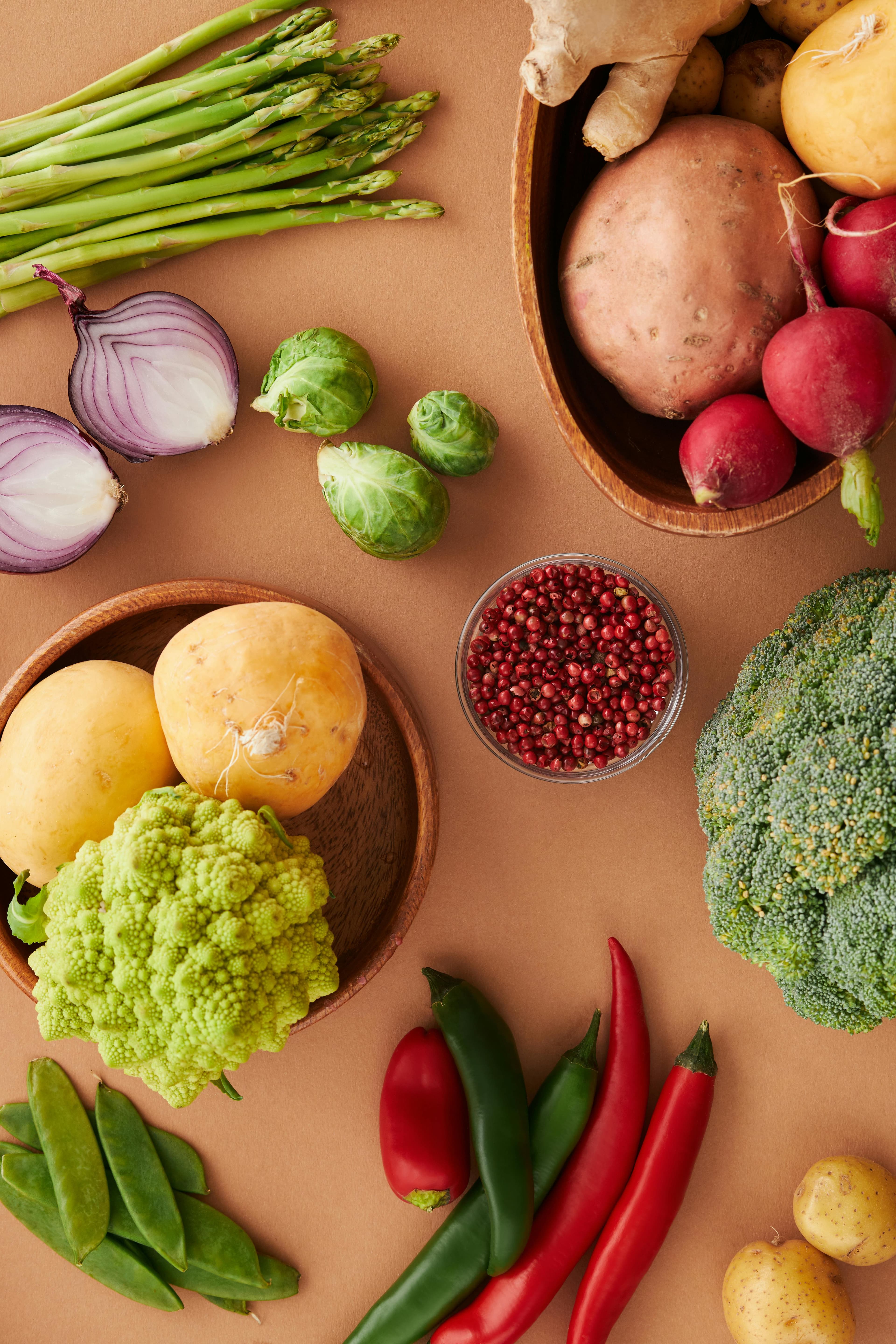Menopause Diet: Complete Nutrition Guide for Managing Symptoms Naturally
Evidence-based dietary strategies to reduce hot flashes, support bone health, and navigate hormonal changes with confidence through targeted nutrition

Key Takeaways
- • The menopause diet focuses on phytoestrogens, calcium, and anti-inflammatory foods to naturally manage symptoms
- • Women following hormone-supporting nutrition report 40-50% fewer severe symptoms
- • Daily targets: 40-80mg isoflavones, 1200mg calcium, 25-30g fiber, and omega-3 fatty acids
- • Avoid common triggers: spicy foods, caffeine after 2PM, alcohol, and refined sugars
- • Use our free menopause meal planner for personalized nutrition guidance
- • Regular meal timing and smaller portions help manage hot flashes and weight
This guide provides evidence-based nutrition strategies for menopause from registered dietitians. For personalized medical advice about menopause management, consult with healthcare professionals through our platform.
If you're navigating menopause, you've likely noticed how profoundly this transition affects your relationship with food. Hot flashes triggered by morning coffee, unexplained weight gain despite unchanged habits, and energy crashes that leave you reaching for quick fixes[1]. The good news? Strategic nutrition can be your most powerful ally in managing menopause symptoms naturally.
As registered dietitians specializing in women's hormonal health, we've helped thousands of women transform their menopause experience through targeted nutrition. This comprehensive guide combines the latest research with practical strategies that actually work in real life—because managing menopause symptoms shouldn't require a PhD in nutrition.
Why Diet Matters More During Menopause
- • Hormonal Support: Declining estrogen affects how your body processes nutrients and stores fat
- • Symptom Management: Specific foods can reduce hot flash frequency by up to 26%
- • Bone Protection: Estrogen loss accelerates bone density decline by 2-3% annually
- • Heart Health: Cardiovascular disease risk increases significantly post-menopause
- • Metabolic Changes: Muscle mass decreases while fat storage patterns shift
Core Principles of the Menopause Diet
The menopause diet isn't a restrictive plan—it's a sustainable approach to eating that supports your body through hormonal changes[2]. By focusing on specific nutrients and food groups, you can significantly reduce symptoms while protecting long-term health.
🌿 The 5 Pillars of Menopause Nutrition
Phytoestrogen-Rich Foods
Plant compounds that gently mimic estrogen effects, helping balance declining hormone levels naturally.
Calcium & Bone-Building Nutrients
Support bone density as estrogen decline increases osteoporosis risk by 2-3% per year.
Anti-Inflammatory Foods
Reduce systemic inflammation that worsens menopause symptoms and increases disease risk.
Heart-Healthy Fats
Protect cardiovascular health as heart disease risk increases significantly after menopause.
Blood Sugar Stabilizers
Maintain steady energy and mood while supporting healthy weight management.
Best Foods for Menopause: The Ultimate List
These evidence-based food recommendations target specific menopause symptoms while supporting overall health[3]. Focus on incorporating variety from each category for comprehensive nutritional support.
🌱 Phytoestrogen Powerhouses
Soy Products:
- • Tofu, tempeh, and edamame
- • Unsweetened soy milk
- • Miso and soy sauce (in moderation)
Seeds & Nuts:
- • Flaxseeds and chia seeds
- • Sesame seeds and tahini
- • Pumpkin seeds and sunflower seeds
Legumes:
- • Chickpeas, lentils, black beans
- • Split peas and kidney beans
🦴 Bone-Building Foods
Calcium Sources:
- • Low-fat dairy (milk, yogurt, cheese)
- • Leafy greens (kale, collards, bok choy)
- • Canned salmon and sardines with bones
- • Fortified plant milks
Vitamin D Sources:
- • Fatty fish (salmon, mackerel, tuna)
- • Fortified foods and supplements
- • Egg yolks from pasture-raised chickens
Magnesium Sources:
- • Dark chocolate, nuts, seeds
- • Avocados and leafy greens
🔥 Anti-Inflammatory Champions
- • Berries: Blueberries, strawberries, cherries
- • Fatty Fish: Wild salmon, sardines, anchovies
- • Leafy Greens: Spinach, kale, arugula
- • Colorful Vegetables: Bell peppers, tomatoes, beets
- • Spices: Turmeric, ginger, cinnamon
- • Green Tea: Rich in antioxidants
- • Olive Oil: Extra virgin, cold-pressed
❤️ Heart-Healthy Choices
- • Omega-3 Rich Foods: Walnuts, flax, chia
- • Whole Grains: Oats, quinoa, brown rice
- • Avocados: Monounsaturated fats
- • Nuts: Almonds, pistachios, pecans
- • Beans & Lentils: Fiber and plant protein
- • Dark Chocolate: 85% cacao or higher
- • Herbs: Garlic, oregano, rosemary

Foods to Limit or Avoid During Menopause
Understanding trigger foods is crucial for symptom management[4]. While individual responses vary, these categories commonly worsen menopause symptoms.
🚫 Symptom Triggers & Health Disruptors
Hot Flash & Sleep Triggers:
- • Spicy Foods: Can trigger hot flashes in 65% of women
- • Caffeine: Especially after 2 PM, disrupts sleep
- • Alcohol: Worsens hot flashes and disrupts sleep quality
- • Hot Beverages: Coffee, tea when consumed hot
- • Refined Sugars: Cause energy crashes and mood swings
Bone & Heart Health Enemies:
- • Excessive Sodium: Increases calcium loss and blood pressure
- • Processed Foods: High in trans fats and additives
- • Sugary Drinks: Contribute to weight gain and inflammation
- • Excess Protein: More than 2g/kg body weight affects calcium
- • High-Mercury Fish: King mackerel, swordfish, shark
"I always tell my patients that managing menopause symptoms through diet isn't about perfection—it's about patterns. Making consistent, thoughtful food choices while allowing flexibility creates sustainable habits that support you through this transition and beyond."
Clinical Nutrition Specialist in Women's Health
Sample 7-Day Menopause Diet Meal Plan
This evidence-based meal plan incorporates all five pillars of menopause nutrition while keeping preparation simple and flavors satisfying.
Hormone-Supporting Weekly Plan (1,800 calories)
Day 1: Phytoestrogen Focus
Phytoestrogens: High | Calcium: 350mg
Plant protein: 28g | Fiber: 12g
Omega-3s: High | Complete protein: 32g
Day 2: Bone Health Priority
Calcium: 450mg | Probiotics: High
Calcium: 300mg | Fiber: 15g
Calcium: 400mg | Omega-3s: Excellent
Day 3: Anti-Inflammatory
Antioxidants: High | Omega-3s: Good
Antioxidants: Excellent | Lean protein: 25g
Plant protein: 20g | Anti-inflammatory: High
Need the complete 7-day plan with recipes and shopping list?
Get Free Menopause Diet PlanManaging Specific Menopause Symptoms Through Diet
Targeted nutritional strategies can significantly improve specific menopause symptoms[5]. Here's how to customize your diet based on your most challenging symptoms.
🔥 Hot Flashes & Night Sweats
Foods That Help:
- • Soy products (reduce frequency by 26%)
- • Ground flaxseed (2 tablespoons daily)
- • Cooling foods (cucumber, melon, mint)
- • Cold herbal teas (peppermint, spearmint)
- • Vitamin E-rich foods (sunflower seeds, almonds)
Triggers to Avoid:
- • Hot and spicy foods
- • Hot beverages and soups
- • Alcohol (especially wine)
- • Caffeine in afternoon/evening
- • Large, heavy meals
😴 Sleep Disruptions
Sleep-Promoting Foods:
- • Tart cherry juice (natural melatonin)
- • Magnesium-rich foods (pumpkin seeds, spinach)
- • Complex carbs in evening (small portions)
- • Herbal teas (chamomile, valerian root)
- • Turkey and other tryptophan sources
Evening Eating Tips:
- • Finish eating 2-3 hours before bed
- • Limit fluids 2 hours before sleep
- • Avoid large meals that raise body temperature
- • Choose light, easily digestible options
- • Keep bedroom snacks cool and mild
🧠 Mood Swings & Brain Fog
Brain-Boosting Nutrients:
- • Omega-3 fatty acids (fish, walnuts, flax)
- • B vitamins (whole grains, leafy greens)
- • Antioxidants (berries, dark chocolate)
- • Choline (eggs, fish, soybeans)
- • Iron (lean meats, beans, spinach)
Mood Stabilizers:
- • Stable blood sugar (regular meals)
- • Probiotic foods (yogurt, kefir, kimchi)
- • Magnesium sources (dark chocolate, nuts)
- • Protein with each meal
- • Limit refined sugars and processed foods
⚖️ Weight Management & Metabolism
Metabolism Supporters:
- • High-protein foods (preserve muscle mass)
- • Green tea (modest metabolic boost)
- • Spicy foods (temporary thermogenic effect)
- • Cold-water fish (omega-3s for metabolism)
- • Whole grains (thermic effect of food)
Portion Control Strategies:
- • Use smaller plates and bowls
- • Fill half your plate with vegetables
- • Include protein with every meal
- • Eat mindfully without distractions
- • Stop eating when 80% full

Supplements to Consider During Menopause
While food should be your primary source of nutrients, certain supplements can provide additional support during menopause when dietary intake may be insufficient.
Evidence-Based Supplements:
- •Calcium + Vitamin D
1200mg calcium + 800-1000 IU vitamin D daily for bone health
- •Omega-3 Fatty Acids
1-2g daily for heart health and inflammation reduction
- •Magnesium
320mg daily for bone health, sleep, and muscle function
- •B-Complex
Support energy metabolism and nervous system function
Herbal Support (Consult Provider):
- •Black Cohosh
May help with hot flashes (40-80mg daily)
- •Red Clover
Contains isoflavones that may ease symptoms
- •Evening Primrose Oil
May help with mood and skin health
Important: Always discuss supplements with your healthcare provider, especially if taking medications.
Hydration & Beverages for Menopause
Proper hydration becomes even more critical during menopause, affecting everything from hot flash severity to skin health and energy levels.
💧 Smart Hydration Strategy
- • Daily Goal: 8-10 cups of fluids
- • Morning Boost: 16-20 oz upon waking
- • Pre-meal: 8 oz water 30 minutes before eating
- • Exercise: Extra 12-16 oz per hour of activity
- • Hot Flash Relief: Cold water or ice chips
- • Evening Limit: Reduce fluids 2 hours before bed
🫖 Beneficial Beverages
- • Green Tea: Antioxidants, mild caffeine (2-3 cups/day)
- • Herbal Teas: Chamomile, peppermint, rooibos
- • Bone Broth: Collagen and minerals
- • Tart Cherry Juice: Natural melatonin for sleep
- • Coconut Water: Natural electrolytes
- • Infused Water: Cucumber, lemon, mint for variety
Beverages to Limit During Menopause
☕ Caffeine:
- • Limit to 200mg/day (2 cups coffee)
- • Avoid after 2 PM for better sleep
- • May trigger hot flashes in some women
🍷 Alcohol:
- • Limit to 3-4 drinks per week
- • Can trigger hot flashes and disrupt sleep
- • Interferes with calcium absorption
🥤 Sugary Drinks:
- • Sodas, energy drinks, sweet teas
- • Contribute to weight gain and mood swings
- • May worsen inflammation
Meal Timing & Eating Patterns for Menopause
Strategic meal timing can significantly impact symptom management and metabolic health during menopause.
⏰ Optimal Eating Schedule
Daily Meal Timing:
- • Breakfast: Within 1-2 hours of waking
- • Lunch: 4-5 hours after breakfast
- • Dinner: 4-5 hours after lunch
- • Evening Cutoff: 2-3 hours before bed
- • Snacks: If needed, between meals
Intermittent Fasting Considerations:
- • 16:8 Method: May work for some women
- • Caution: Can worsen symptoms in others
- • Start Gradually: 12-hour eating window first
- • Monitor: Sleep, energy, mood changes
- • Stop if: Symptoms worsen or energy drops
"The key to successful menopause nutrition isn't following a rigid diet—it's creating a flexible framework that honors your body's changing needs while fitting seamlessly into your life. Small, consistent changes lead to remarkable results over time."
Board-Certified Endocrinologist
Creating Your Personal Menopause Diet Plan
Every woman's menopause journey is unique. Creating a personalized nutrition plan ensures you address your specific symptoms and health goals effectively.
📝 Step 1: Assess Your Symptoms
Track your most bothersome symptoms for 1-2 weeks to identify patterns and priorities.
Common Symptoms to Track:
- • Hot flashes and night sweats
- • Sleep quality and duration
- • Mood changes and irritability
- • Energy levels throughout the day
- • Weight changes and cravings
Track Potential Triggers:
- • Foods and beverages consumed
- • Meal timing and size
- • Stress levels and sleep quality
- • Physical activity
- • Environmental factors
🎯 Step 2: Customize Your Approach
Based on your symptoms, emphasize specific dietary strategies.
Hot Flash Focus:
- • Increase soy foods
- • Add ground flaxseed daily
- • Avoid spicy foods and alcohol
- • Choose cooling foods
Sleep Priority:
- • Magnesium-rich foods
- • Tart cherry juice
- • Limit evening caffeine
- • Light evening meals
Weight Management:
- • Higher protein intake
- • Controlled portions
- • Regular meal timing
- • Limit processed foods
⚡ Step 3: Make Gradual Changes
Implement changes slowly to allow your body to adapt and to identify what works best.
Week 1-2:
- • Add 1 phytoestrogen-rich food daily
- • Increase water intake
Week 3-4:
- • Include calcium sources with meals
- • Reduce trigger foods
Week 5-6:
- • Optimize meal timing
- • Add anti-inflammatory foods
Week 7-8:
- • Fine-tune portions
- • Assess progress
Troubleshooting Common Challenges
Solutions for Real-Life Obstacles:
- • "I don't have time to cook elaborate meals": Focus on simple preparations like sheet pan dinners and slow cooker meals
- • "My family won't eat menopause-friendly foods": Make small modifications to family meals for yourself
- • "I'm too tired to meal prep": Start with just prepping one component, like washing greens
- • "Healthy food is too expensive": Prioritize affordable staples like beans, eggs, and frozen vegetables
- • "I travel frequently for work": Pack portable options and research restaurant menus in advance
Your Menopause Diet Questions Answered
Research shows that women consuming 40-80mg of soy isoflavones daily (equivalent to 1-2 servings of soy foods) experience 10-26% fewer hot flashes compared to those not consuming soy. The effect varies by individual and may take 6-12 weeks to notice. Studies indicate Asian women who consume soy regularly throughout life have fewer menopause symptoms.
Women over 50 need 1,200mg of calcium daily, along with 800-1,000 IU of vitamin D for optimal absorption. This typically requires both food sources and supplements since it's difficult to get enough from diet alone. Estrogen decline increases bone loss by 2-3% per year, making calcium crucial for preventing osteoporosis.
Diet can significantly improve menopause symptoms for many women, with some experiencing 40-50% symptom reduction through nutrition changes alone. However, severe symptoms may require hormone therapy or other treatments. Diet works best as part of a comprehensive approach including lifestyle changes, exercise, and stress management.
Not necessarily. About 65% of women find that spicy foods trigger hot flashes, but sensitivity varies. Try eliminating spicy foods for 2-3 weeks, then gradually reintroduce them to identify your personal tolerance level. Some women can handle mild spices but not hot peppers. Keep a symptom diary to track your triggers.
Regular meal timing helps stabilize blood sugar and hormones. Aim for meals every 4-5 hours, with a lighter dinner 2-3 hours before bed to improve sleep. Some women benefit from smaller, more frequent meals to manage hot flashes and energy levels. Avoid skipping meals as this can worsen symptoms.
Focus on protein-rich foods (25-30g per meal) to preserve muscle mass, high-fiber foods for satiety, and foods with a low glycemic index to stabilize blood sugar. Green tea may provide a modest metabolic boost. The Mediterranean diet pattern has shown success for weight management during menopause.
Yes, common trigger foods include alcohol (especially wine), caffeine, spicy foods, high-sugar items, and processed foods high in sodium. These can worsen hot flashes, sleep disruption, and mood swings. Individual triggers vary, so tracking your diet and symptoms helps identify personal problem foods.
Take Action: Your Menopause Nutrition Journey Starts Today
The menopause diet isn't about restriction—it's about nourishing your body through one of life's most significant transitions. By incorporating phytoestrogen-rich foods, prioritizing bone health, and managing triggers, you can significantly reduce symptoms and protect your long-term health.
Remember, every woman's menopause journey is unique. What works for one may not work for another. Start with small changes, track your progress, and adjust as needed. With patience and the right nutritional strategies, you can navigate menopause with confidence and vitality.
Ready to Transform Your Menopause Experience Through Nutrition?
Get personalized meal plans and expert guidance designed specifically for managing menopause symptoms naturally.
References
- 1.Messina, M. (2016). Soy and Health Update: Evaluation of the Clinical and Epidemiologic Literature. Nutrients, 8(12), 754.External link
- 2.The North American Menopause Society. (2023). The 2023 Nonhormone Therapy Position Statement. Menopause, 30(6), 573-590.External link
- 3.Dunneram, Y., et al. (2018). Dietary intake and age at natural menopause: results from the UK Women's Cohort Study. Journal of Epidemiology & Community Health, 72(8), 733-740.External link
- 4.Barnard, N.D., et al. (2021). The Women's Study for the Alleviation of Vasomotor Symptoms (WAVS): a randomized, controlled trial of a plant-based diet. Menopause, 28(10), 1150-1156.External link
- 5.National Institute on Aging. (2023). Menopause: Tips for a Healthy Transition. NIH Publication No. 23-AG-7981.External link
Related Articles
Continue your PCOS journey with these helpful guides
Menopause Weight Loss: Science-Based Strategies That Work
Evidence-based approaches to managing weight gain during menopause, including hormonal factors and practical solutions.
Perimenopause Nutrition: What to Eat During the Transition
Navigate the perimenopause transition with targeted nutrition strategies for symptom management and long-term health.
Hormone-Balancing Foods: Natural Support for Women's Health
Discover foods that naturally support hormonal balance throughout different life stages.
Weekly Menopause Nutrition Tips
Get evidence-based meal plans, symptom management strategies, and the latest research on menopause nutrition delivered to your inbox.
No spam, unsubscribe at any time.
Last Updated: 9/4/2025
Medical Disclaimer: This menopause diet guide is for educational purposes only and does not constitute personalized medical advice. Menopause symptoms and nutritional needs vary significantly among individuals. Always consult with qualified healthcare professionals and registered dietitians for personalized guidance tailored to your specific health needs, medications, and medical history.